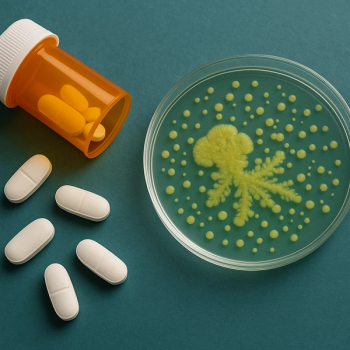
Inflammatory Bowel Disease and C. difficile Infection (CDI)
A gastroenterologist, Dr. Bincy Abraham, provides an overview of C. difficile infection (CDI) in patients with inflammatory bowel disease (IBD).
Episodes in this series

Paul Feuerstadt, MD: We're now going to shift gears and we're going to talk about a special population, which is a population with inflammatory bowel disease. Now, Bincy, can you walk us through a little bit of the epidemiology of inflammatory bowel disease, C. difficile infection, and the combination of the two?
Bincy Abraham, MD, MS: Absolutely. Paul, I'm so glad you're bringing this up because there is a huge burden of disease in this population. We've seen that the incidence of C. [Clostridioides] difficile infection has increased over the years, and we've seen that it's also higher than the non-IBD [inflammatory bowel disease] patient population. We also know that it can lead to worsened outcomes of their inflammatory bowel disease as well. In fact, one study showed that for hospitalized patients with IBD, 12% of Crohn's patients, and up to 20% of ulcerative colitis patients, C. diff infection was found when they were in the hospital. The other aspect of this is that we talked about all these traditional risk factors. Tom went through all those aspects of modifiable versus unmodifiable bowel risk factors. Interestingly, in the inflammatory bowel disease population, they typically don't have those traditional risk factors. In fact, most of our patients with C. diff with IBD are younger in age. They're not necessarily elderly, of course, that's a separate risk factor. Often, we find this as a community-acquired infection, not necessarily from hospitalization, nor necessarily from antibiotic use. We think that patients with inflammatory bowel disease are more likely to be colonized with C. difficile, and develop active infection, typically when IBD is active. We suspect this is most likely due to an altered microbiome with the different flora when there is active inflammation. We know that's different, and we see worsened species, and just the entire microbiome has changed in someone who has active inflammation from their inflammatory bowel disease compared to a healthy microbiome in patients that are normal, in a healthy population, as well as to an IBD patient that's actually in remission of their disease, too. We think all those factors contribute to this increased incidence.
Paul Feuerstadt, MD: Right, and we've been seeing more and more inflammatory bowel disease, and we've been seeing more C. diff. So, the combination together is really important to understand. Interestingly enough, we've also seen the proportion of patients that get diagnosed with C. difficile, the proportion that have inflammatory bowel disease has progressively increased as well. We're really not sure why that is. It could be a result of new medications that the patients with inflammatory bowel disease have been treated with. That hasn't fully been delineated. Can you walk us through a little bit in terms of the incidence of C. difficile infection in patients with ulcerative colitis versus Crohn's disease?
Bincy Abraham, MD, MS: We see C. diff infection in both ulcerative colitis and Crohn's patients. We generally tend to see it more in patients that had colonic disease, which makes sense, right? Where there's more changes and disruption, the microbiome in the colon, there's less bacterial activity and numbers in the small bowel. We see it in both diseases, we generally have seen it more so in ulcerative colitis patients because we know in ulcerative colitis, of course, it affects the colon. In our Crohn's patients, we generally tend to see it in our Crohn's colitis patients, not so much in the patients that have only isolated small bowel disease, which also makes sense from a microbiome perspective. Now, on the other hand, even in my own practice, I have seen C. difficile ileitis and C. difficile enteritis in those patients of mine with Crohn's disease that affects their small bowel. Although this is much less frequently seen, this tells us that Clostridioides difficile isn't necessarily confined to causing inflammation just in the colon; it can affect practically anywhere in the GI tract, although limited to areas where there's less bacterial flora.
Paul Feuerstadt, MD: Excellent, yes. That's a really important point, C. difficile most commonly affects the colon, but we need to think of it sometimes both in terms of the small bowel, but also extra-intestinally, which it's rarely been reported as well, being an anaerobe. However, we certainly do see it in patients with IBD and in the terminal ileum, etcetera.
Transcript edited for clarity
Newsletter
Stay ahead of emerging infectious disease threats with expert insights and breaking research. Subscribe now to get updates delivered straight to your inbox.






































































































































